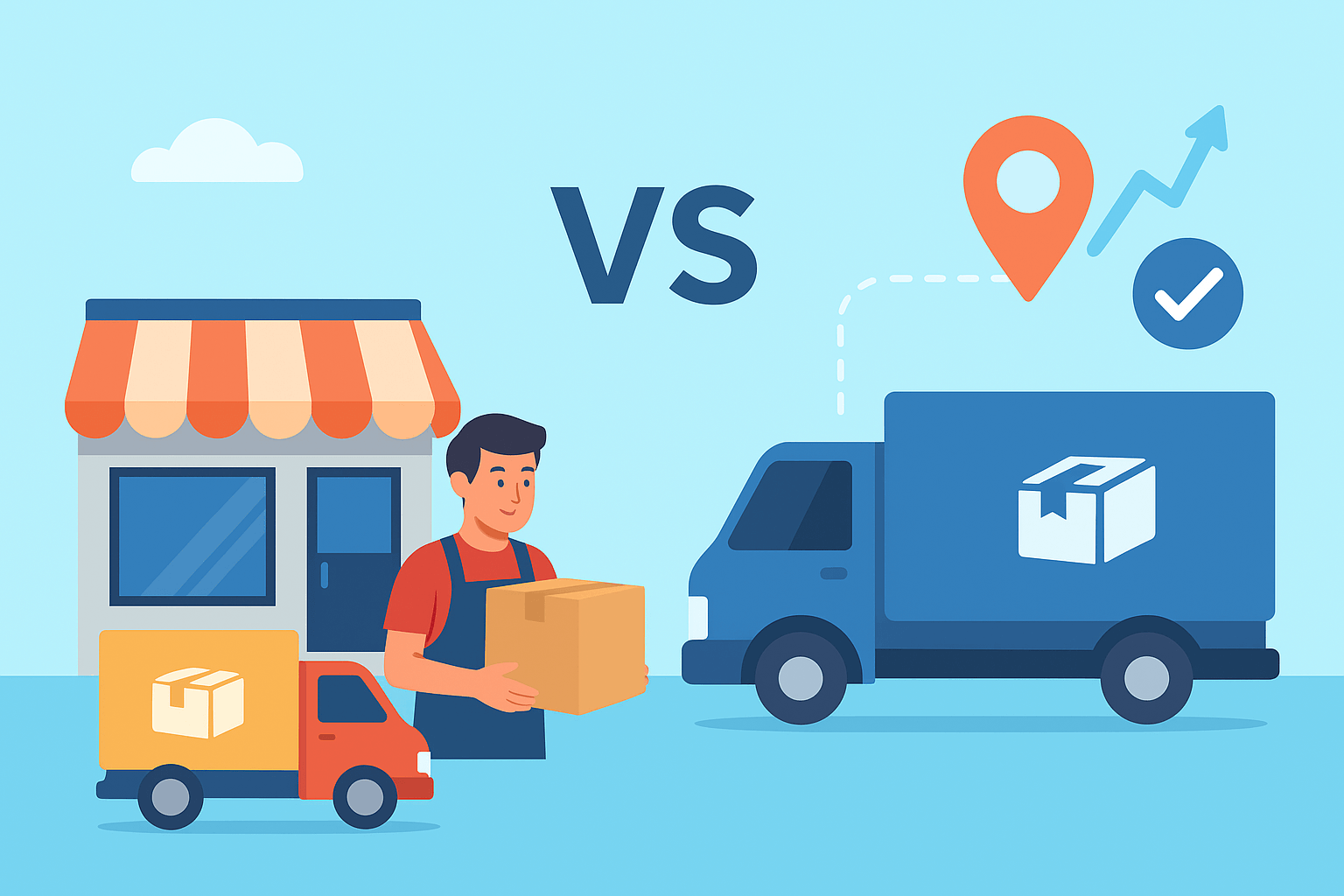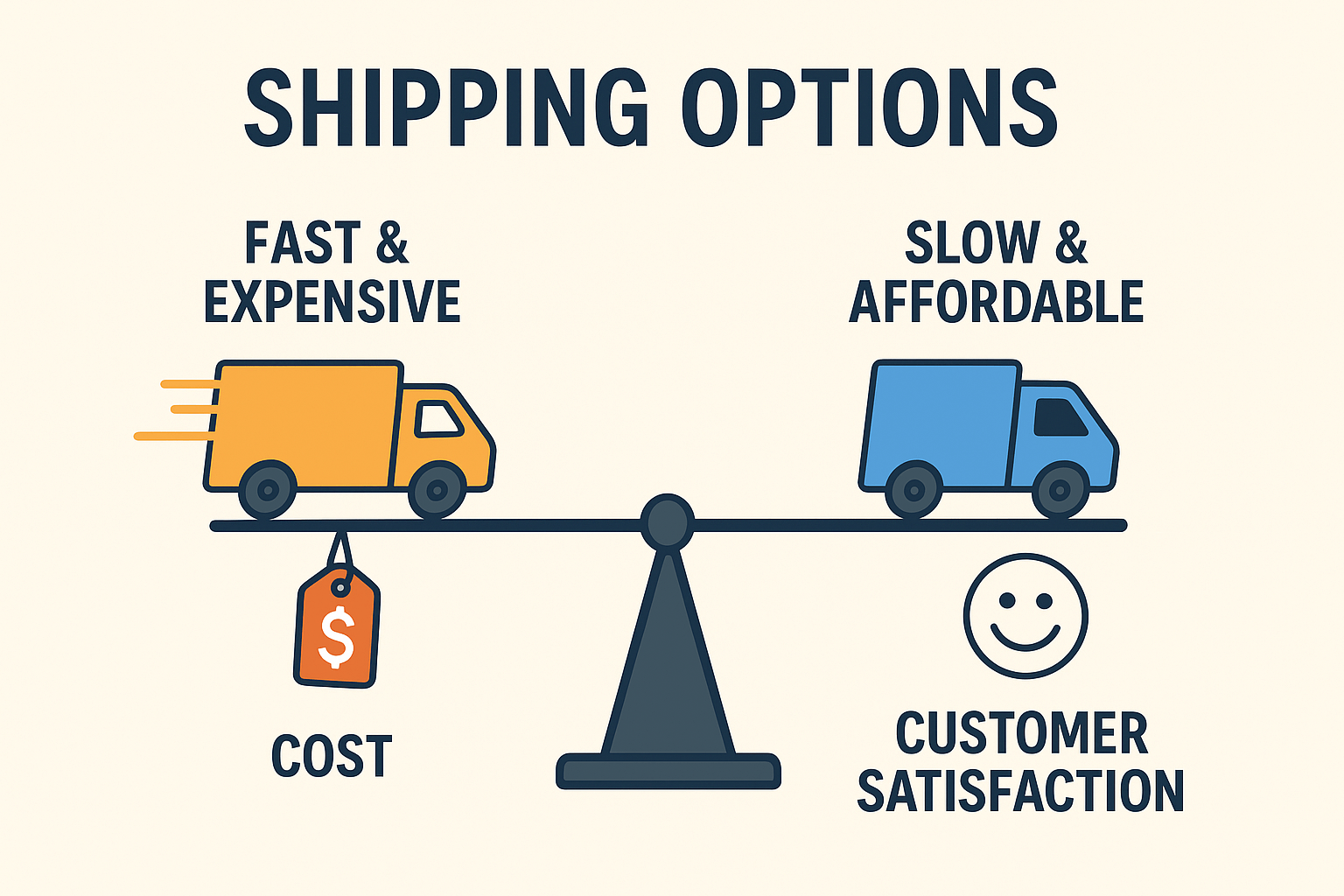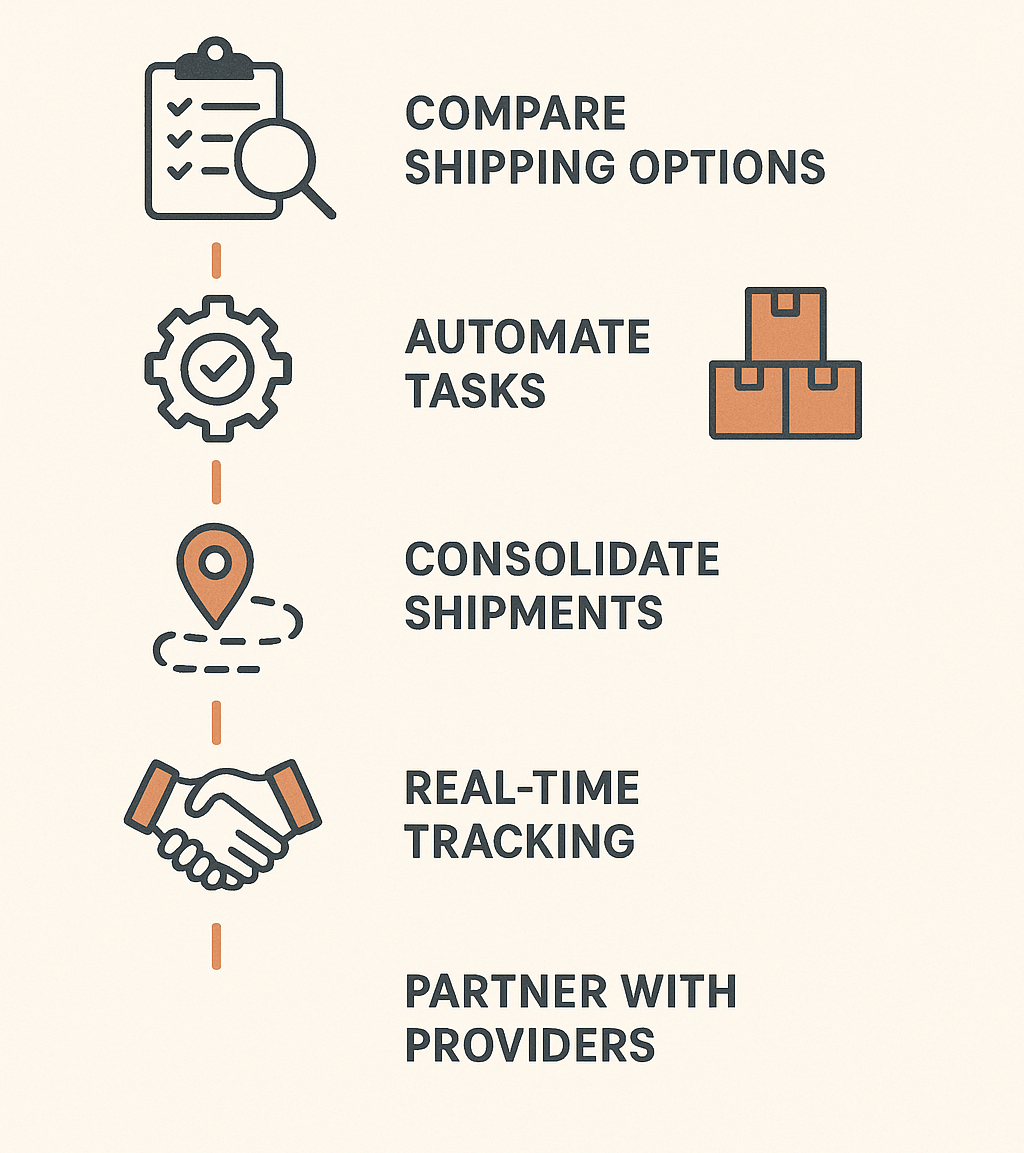Shipping can make or break a small business. Fast, affordable, and reliable delivery keeps customers happy, but managing logistics on a tight budget is challenging. This guide takes a closer look at small business shipping, highlights common hurdles, and offers practical tips to save money, improve efficiency, and stay competitive — helping your business deliver better service without overspending.
Table of Content:
- What Makes Shipping So Important for Small Businesses?
- What Are the Main Challenges in Small Business Shipping?
- How Do Transportation Costs Affect Profitability?
- Why Is Planning and Organization Key to Smooth Shipping?
- Should You Manage Logistics In-House or Outsource to Experts?
- How Can Outsourcing to YK Freight Help Small Businesses Save?
- What Practical Steps Can Small Businesses Take to Improve Shipping Efficiency?
- How Can Small Businesses Stay Competitive in the Long Run?
What Makes Shipping So Important for Small Businesses?
For small businesses, shipping isn’t just about getting a product from point A to point B — it’s a major part of customer satisfaction and business success. In today’s market, buyers expect quick, affordable, and reliable delivery every single time. That means even the smallest company has to compete with large retailers that offer free next-day shipping and real-time tracking.

The problem is, most small businesses don’t have the same resources or logistics networks as big brands. Every extra shipping fee or delivery delay can cut into profits and damage a company’s reputation. For example, imagine a small online store selling car accessories. When customers expect their orders to arrive within two days — often at no extra cost — the business owner faces a tough choice: raise product prices to cover delivery costs or absorb the expense and risk losing profit.
The same goes for local auto parts resellers or small repair shops that depend on regular shipments. A single late delivery can slow down their work, frustrate customers, and create unexpected losses. That’s why efficient and affordable shipping isn’t a luxury — it’s a necessity. It keeps orders moving, customers happy, and small businesses competitive, even when working with a limited budget.
What Are the Main Challenges in Small Business Shipping?
Running a small business often means wearing many hats — owner, marketer, accountant, and sometimes even shipper. When it comes to logistics, this can quickly become overwhelming. Unlike large corporations with full logistics departments, small businesses usually have limited staff and resources. As a result, they face several common challenges that make efficient shipping difficult.
One of the biggest issues is high transportation costs. Shipping rates can fluctuate depending on fuel prices, distance, or package weight, making it hard to predict expenses. For a small company, these unexpected costs can eat up profits fast. Imagine a startup selling custom auto parts online. The owner wants to keep delivery prices low to attract customers, but when shipping fees spike, it becomes nearly impossible to stay competitive without losing money.
Another major challenge is poor planning and lack of organization. Without a clear logistics strategy, many small businesses struggle with scheduling pickups, tracking shipments, or managing returns. Delays or lost packages can quickly frustrate customers and damage the company’s reputation.
Then there’s the issue of limited staff and time. Small business owners often handle multiple roles, leaving little room for managing complex shipping tasks. As a result, shipping becomes reactive — done in a hurry — instead of being part of a well-organized process.
How Do Transportation Costs Affect Profitability?
For small businesses, every dollar matters — and shipping costs can quickly become one of the biggest expenses. Transportation rates often change without warning due to fuel price increases, seasonal demand, or carrier surcharges. For a company working with tight margins, these unpredictable fees can make the difference between profit and loss.
Take, for example, a small business that sells car parts online and ships orders nationwide. Customers expect quick delivery, but premium shipping services often come with high price tags. If the business chooses the fastest option for every order, the cost per shipment can easily exceed the profit made on each sale. On the other hand, using cheaper delivery methods might lead to delays, lost packages, or unhappy customers. It’s a constant balancing act — save money or keep customers satisfied.

Many small business owners also underestimate hidden shipping expenses such as packaging, insurance, or return handling. Over time, these small costs add up, silently eating away at profit margins. Without a clear shipping strategy or reliable partner, it becomes difficult to control these variables and plan ahead.
That’s where choosing the right shipping partner makes all the difference. Working with a company like YK Freight allows small businesses to access multiple carrier options, compare rates, and find the most cost-effective solution for each delivery. Instead of overpaying for speed or risking unreliable service, they can strike the right balance between affordability and dependability.
Why Is Planning and Organization Key to Smooth Shipping?
In shipping, timing and coordination mean everything. When orders don’t arrive as promised, customers notice — and they don’t always give second chances. Poor planning is one of the main reasons small businesses struggle with late deliveries, missed pickups, or disorganized returns. Without a clear structure, even a small increase in orders can turn into chaos.
For example, imagine a small e-commerce shop selling car detailing products. During a seasonal sale, order volume doubles overnight. Without a system to manage shipments, the owner spends hours juggling carrier schedules, labeling boxes manually, and answering customer inquiries. As a result, some packages go out late, customers get frustrated, and the business loses repeat buyers.
That’s why planning and organization are essential to smooth shipping. Creating a simple, step-by-step logistics plan — from packaging to delivery — helps reduce errors and delays. But more importantly, technology can make this process far easier.
Tools like transportation management systems (TMS) or online shipping platforms can automate many routine tasks. They allow businesses to compare carrier rates, generate labels, schedule pickups, and track shipments — all in one place. These systems also provide visibility into shipping costs, helping owners identify where money is being wasted and where it can be saved.
Even small automation steps can make a big difference. For instance, setting up automatic shipment tracking updates can cut down on customer service calls, while digital records reduce paperwork and confusion.
Should You Manage Logistics In-House or Outsource to Experts?
When it comes to managing logistics, small business owners often face a tough decision — should they handle everything themselves or trust an outside expert? Both options have advantages, but the right choice depends on your goals, budget, and the scale of your operations.
Managing logistics in-house gives you full control. You oversee every shipment, choose carriers directly, and maintain close communication with customers. For some small businesses, especially those shipping limited volumes locally, this can seem like the simplest approach. However, it also means handling everything yourself — from negotiating rates and tracking deliveries to managing returns and dealing with unexpected delays. Without the right tools or experience, these tasks can quickly become overwhelming and time-consuming.
On the other hand, outsourcing logistics to professionals can significantly lighten the load. Working with a trusted partner like YK Freight allows small businesses to tap into a larger logistics network without the high costs of building one from scratch. YK Freight has relationships with multiple carriers, giving you access to competitive rates and flexible delivery options that individual businesses often can’t secure on their own.
Outsourcing also provides access to advanced shipping technology — from automated tracking systems to detailed cost reporting — without requiring any investment in software or additional staff. Instead of spending hours organizing shipments, small business owners can focus on growing their business while experts handle the logistics behind the scenes.
Of course, some owners worry about losing control when outsourcing. But with the right partner, transparency remains high. YK Freight provides detailed updates, performance reports, and customer support, so you always know what’s happening with your shipments.
How Can Outsourcing to YK Freight Help Small Businesses Save?
For small businesses, every cost-saving opportunity matters — especially when it comes to shipping. Outsourcing logistics to YK Freight can make a real difference by cutting unnecessary expenses and improving overall efficiency. Instead of managing shipping on their own, small business owners gain access to YK Freight’s experience, technology, and wide network of trusted carriers — all without the need for costly in-house infrastructure.
One of YK Freight’s biggest advantages is its ability to negotiate better freight rates. Because YK Freight works with multiple carriers and handles a high volume of shipments, it can secure discounts that individual small businesses usually can’t get on their own. This means you get professional service and reliable delivery at a fraction of the usual cost. In fact, companies that partner with YK Freight typically save between 10% and 30% on their overall shipping expenses.
Another major benefit is flexibility. YK Freight helps small businesses choose the best shipping option for each order — whether it’s a fast delivery to a local customer or an affordable long-distance shipment. This kind of adaptability helps maintain strong customer satisfaction without overspending.
Outsourcing also eliminates the need to invest in expensive logistics tools or staff. With YK Freight, you get access to advanced tracking systems, automated reporting, and real-time shipment visibility — features that would otherwise require major investment. Everything is handled by experts, so you can focus on running and growing your business while staying confident that your deliveries are in good hands.
What Practical Steps Can Small Businesses Take to Improve Shipping Efficiency?
Improving shipping efficiency doesn’t always require a huge budget or a full logistics department. Often, small changes in how you plan, organize, and manage deliveries can make a big difference. Here are some practical, low-cost steps that small businesses can take to save time, reduce errors, and cut shipping costs.

1. Compare shipping options regularly.
Shipping rates and carrier performance can change quickly. What was affordable a few months ago may no longer be the best deal today. By comparing rates and delivery times across several carriers, you can find the most cost-effective solution for each shipment. Partnering with YK Freight makes this easier, as they provide access to multiple carriers and help identify the best combination of price and reliability.
2. Automate routine logistics tasks.
Manual work slows things down and increases the chance of mistakes. Automation tools — such as shipping management software or online booking platforms — can handle repetitive tasks like creating labels, scheduling pickups, and tracking orders. This saves valuable time and allows small business owners to focus on sales, marketing, or customer service instead.
3. Consolidate shipments when possible.
Sending several small packages separately can cost much more than combining them into one larger shipment. By grouping deliveries headed to the same area, you can cut down on transportation costs and reduce your environmental impact. YK Freight can help plan consolidated shipments efficiently so you save money without compromising speed.
4. Use real-time tracking to avoid delays.
Visibility is key in logistics. With real-time tracking, you always know where your shipments are and when they’ll arrive. This allows you to quickly respond to any issues and keep customers informed. Many of YK Freight’s solutions include advanced tracking tools that provide instant updates, helping businesses stay one step ahead.
5. Partner with experienced providers like YK Freight.
Managing logistics alone can be stressful and time-consuming. Working with a trusted partner gives you access to professional support, better carrier rates, and modern logistics tools — without the high costs of building your own system. YK Freight takes care of the heavy lifting so your business can focus on growth.
How Can Small Businesses Stay Competitive in the Long Run?
For small businesses, staying competitive isn’t just about offering the right products or services — it’s also about how reliably and efficiently you get them to your customers. Shipping plays a major role in building trust and keeping customers happy. A single late delivery or damaged package can harm your reputation and discourage repeat business, while fast, affordable, and dependable shipping can turn first-time buyers into loyal customers.
Efficient logistics also allows small businesses to compete with larger companies, even on a limited budget. By optimizing shipping processes, comparing carrier rates, and consolidating orders when possible, small business owners can offer better delivery options without overspending. For example, a local auto parts reseller can provide nationwide shipping at reasonable rates while ensuring orders arrive on time — something that might have seemed impossible without careful planning and the right logistics partner.
Another key factor is customer communication. Reliable tracking and proactive updates show customers that you value their time and care about their experience. This kind of transparency builds confidence and strengthens your brand reputation. Over time, customers will associate your business with trustworthiness and efficiency — qualities that are often more important than price alone.
Partnering with experienced providers like YK Freight can make long-term competitiveness achievable. By offering access to multiple carriers, flexible shipping solutions, and cost-effective rates, YK Freight helps small businesses maintain high service standards without breaking the budget.
Further Reading:
Reducing Logistics Costs: Tips from YK Freight Experts
How to Cut Costs on Last Mile Delivery: Smart Tips for Savings
What to Do When Your Freight Is Lost: A Step-by-Step Guide with YK Freight
How to Optimize Your Oil and Gas Supply Chain for Cost and Efficiency






ASK YOUR QUESTIONS